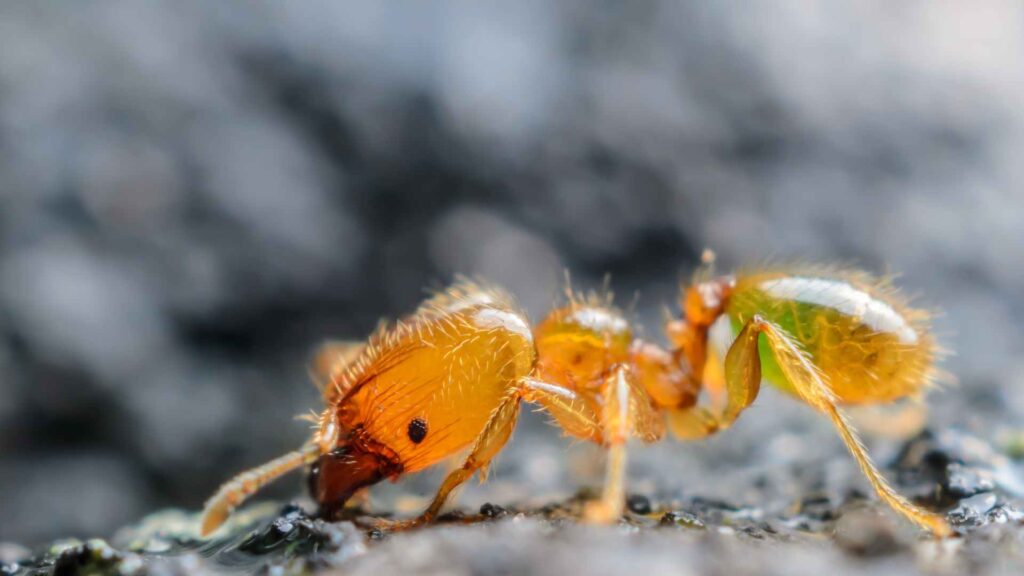Table Of Content
ToggleAs a pest control expert, I know how frustrating and inconvenient citronella ants can be. These tiny invaders leave a lemony scent behind when crushed, hence their name.
But getting rid of them doesn’t have to be a mystery. This guide will equip you with everything you need to know about citronella ants, from identification to elimination strategies.
Citronella ants are small, yellowish-brown ants typically measuring around 1/8 inch long. They’re easily recognizable by the citrusy odor they release when squashed. These ants prefer to nest outdoors in moist soil, under mulch, or near decaying wood.
Locating a citronella ant colony is key to effective control. Look for trails of ants foraging for food inside your home or garden. They might be trailing towards crumbs, sugary spills, or pet food. Outside, check for nests under decks, patios, or near the foundation of your house. Look for small mounds of soil or loose debris around potential nesting sites.
While citronella ants aren’t as destructive as some other ant species, they can still be a nuisance. Their presence can be unsettling, and their constant foraging can contaminate food surfaces. Additionally, their nesting habits can sometimes damage insulation or electrical wires.
No More Ants: Let Our Skilled Team Safeguard Your Space!

There are several ways to tackle a citronella ant infestation, from natural remedies to professional pest control. Let’s delve deeper into each option and explore how to apply them effectively:
Important Note: While natural methods are safe and readily available, they may not be effective for large infestations or persistent colonies. They often target worker ants and may not reach the queen, hindering complete elimination.
For large infestations or recurring problems, consider calling a professional pest control service. They have access to stronger insecticides and can locate and eliminate hidden colonies.
A professional can also provide long-term prevention strategies.
Keep Your Home Ant-Free: Trust Our Proven Removal Solutions!

Once you’ve eliminated the citronella ant problem, focus on preventing them from returning:
As a pest control expert, I understand the frustration citronella ants can cause. By following the strategies outlined above, you can effectively eliminate these unwanted guests and prevent them from returning.
Remember, choose the method that best suits your situation and preferences, and don’t hesitate to seek professional help for stubborn infestations.
To keep citronella ants away, maintain a clean environment, manage landscaping to eliminate ant-friendly conditions, and use natural repellents or chemical treatments as preventative measures. Regularly clean up food debris, ensure proper waste disposal, adjust the type of mulch and the positioning of plants in your garden, and consider barriers like diatomaceous earth or essential oils. For more persistent issues, periodic application of ant baits or non-repellent insecticides around the perimeter of your home can also be effective.
You may have citronella ants due to attractive conditions in and around your home, such as moist soil, organic debris, and easy access to food sources. Citronella ants are particularly drawn to areas with high moisture levels, which are ideal for their nesting sites. They often enter homes in search of food or during their mating flights, which occur in late spring or early summer.
The best pesticide for citronella ants typically includes baits that contain boric acid or fipronil, and non-repellent liquid insecticides. Baits work effectively as they are carried back to the colony, thus targeting the queen and the workers systematically. Non-repellent sprays, such as those containing fipronil or imidacloprid, are useful because the ants do not detect them and hence do not avoid them, ensuring that the pesticide reaches the colony.
No, citronella ants are not termites; they are a type of ant known for the citrus-like odor they emit when crushed. Unlike termites, which consume wood, citronella ants primarily feed on honeydew produced by aphids and scale insects. They are often mistaken for termites due to their subterranean nesting habits and the occasional swarms they produce, which are similar to termite swarming behaviors.
References:
https://bugguide.net/node/view/455190
https://www.fireants.org.au/look/biology-and-ecology/ant-types#:~:text=Worker ants are sterile and,colony to search for food.
https://wasps.ucr.edu/wasp-identification#:~:text=There are several species of,consobrina).
Your trusted pest control experts in Southern California. Keeping your neighborhood pest-free!